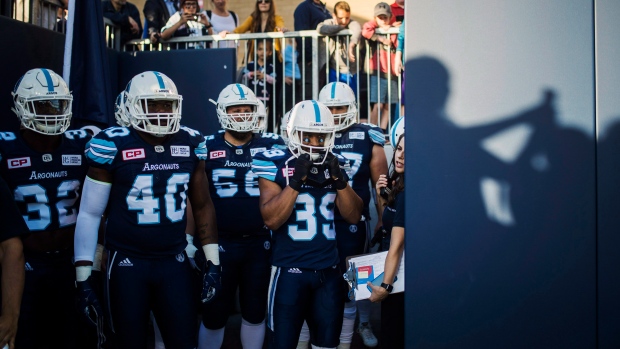Apr 10, 2018
MLSE unveils its vision for the Argonauts
Sports and entertainment company is taking a long-term and realistic approach to the challenge that is the CFL in Toronto, Dave Naylor writes.
By Dave Naylor

There have been more than a few folks who’ve had their turn at trying to unlock the puzzle that is the Toronto Argonauts over the past 30 years.
Perpetually in need of a solution to make the franchise more relevant and desperately wanting to connect to the city in a meaningful way, all kinds of things have been either proposed or tried by various owners. From signing Notre Dame star Raghib "Rocket" Ismail to the richest contract in pro football history (at the time), to pregame wet T-shirt contests, to an appearance from boxing legend Muhammed Ali, to Ricky Williams and Ricky Ray.
They’ve had local owners, American owners and even a guy who owned two CFL teams at the same time.
None of it has ever really changed the big picture, with the Argos decidedly last among the city’s top-five professional sports franchises, overtaken not just by giants from Major League Baseball and the NBA, but by a professional soccer team that plays in a league that didn’t exist 25 years ago.
On Monday, Maple Leaf Sports & Entertainment Ltd., the same people who helped turn Toronto FC into a phenomenon, unveiled its vision for the oldest professional sports franchise in North America. Over the past two seasons, the Argos had been owned by two-thirds of the MLSE partnership – Bell and Larry Tanenbaum – but it wasn’t until January that a deal was announced to allow MLSE to put the full weight of its resources behind the Argos.
On the surface, it’s a tantalizing marriage: a sports and entertainment company that makes money hand over fist and a CFL team that hasn’t turned a profit since the 1980s.
Could MLSE be the answer, the missing piece to the Argonaut puzzle?
What we learned on Monday is that MLSE doesn’t have any magic business solution for the Argos, which is probably a good thing.
Instead, it unveiled a smart, common sense, long-term and realistic approach to the challenge that is the CFL in Toronto. There are no Hail Mary plays in the MLSE handbook for the Argos.
They’re lowering ticket prices and offering discounts on concessions. They’re closing off the upper east stands to lower capacity of BMO Field for football to below 20,000. They’re promising a better in-game experience and the continuation of a competitive team, coming on the heels of last season’s unexpected Grey Cup win.
And they’ve introduced some edgy branding that’s aimed at connecting the team to the self-important identity of the city.
If they can add a few thousand fans per game, they’ll consider 2018 a success from a business standpoint. And they’d love to sell the place out.
Beyond that, behind the scenes they’ll no doubt be trying to leverage every advantage that comes with having resources, economic might and ability to reach out to some of the wealthiest and most influential people in the city.
Argo research last season revealed a shockingly poor awareness among general sports fans in Toronto of when the team was playing. Presumably, the reach of MLSE can do something about that.
Monday also marked the unofficial end to the vision of the Argos as presented by former team president Michael Copeland, who had championed the idea that tailgating would change the meaning of going to an Argonaut game, especially among the city’s young adult demographic.
The Argos promotion of tailgating in the run-up to that first season at BMO mostly overshadowed anything about the team of the CFL itself. It's hard to say it wasn’t worth a try, given that traditional marketing approaches had failed to move the needle, but reality is that those good vibes in the parking lot didn’t translate at the gate.
Copeland, the former CFL chief operating officer, had predicted 20,000 season ticket holders and sellout games for the team’s first season in its new home.
Instead, the Argos were last in attendance both in 2016 and 2017, with an almost 50 per cent attrition rate on season tickets over that span, from roughly 7,000 to 3,600 one year ago. Toronto finished last in attendance each of the past two seasons and averaged fewer than 14,000 fans per game, despite finishing first in the East Division.
Team president Bill Manning announced Monday that tailgating won’t be back because the costs associated with it simply didn’t justify the return. That news drew a vocal protest on Twitter from members of a loyal but presumably small core of the city’s sports fans.
So will MLSE’s approach be any more successful that previous Argo reinventions?
In the short-term, there is reason for optimism based on the Argos having sold 600 more season tickets for this upcoming season than were sold all of last year.
But MLSE has accepted this will be a long-term play, with progress measured over years rather than months. (When Manning recently spoke at Ryerson he asked for a show of hands from TFC fans and got nearly two-thirds in the air. When he asked for Argo fans, he got one.)
Patience is something most previous Argo owners have promised but few have had the resources to see through.
These may still be lean times for the CFL in Toronto and the Argos will never return to the prominence they once enjoyed. But you don't have to be an eternal optimist to believe there are better days ahead for the franchise.


